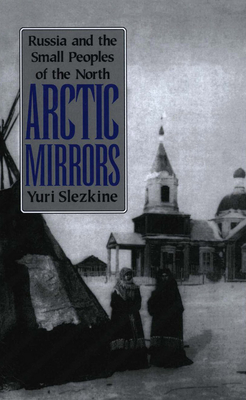

 Cornell University Press
Cornell University Press
Arctic Mirrors: Radical Evil and the Power of Good in History


Key Metrics
- Yuri Slezkine
- Cornell University Press
- Paperback
- 9780801481789
- 9.25 X 6.34 X 1.15 inches
- 1.52 pounds
- History > Russia & the Former Soviet Union
- English
 Secure Transaction
Secure TransactionBook Description
For over five hundred years the Russians wondered what kind of people their Arctic and sub-Arctic subjects were. They have mouths between their shoulders and eyes in their chests, reported a fifteenth-century tale. They rove around, live of their own free will, and beat the Russian people, complained a seventeenth-century Cossack. Their actions are exceedingly rude. They do not take off their hats and do not bow to each other, huffed an eighteenth-century scholar. They are children of nature and guardians of ecological balance, rhapsodized early nineteenth-century and late twentieth-century romantics. Even the Bolsheviks, who categorized the circumpolar foragers as authentic proletarians, were repeatedly puzzled by the peoples from the late Neolithic period who, by virtue of their extreme backwardness, cannot keep up either economically or culturally with the furious speed of the emerging socialist society.Whether described as brutes, aliens, or endangered indigenous populations, the so-called small peoples of the north have consistently remained a point of contrast for speculations on Russian identity and a convenient testing ground for policies and images that grew out of these speculations. In Arctic Mirrors, a vividly rendered history of circumpolar peoples in the Russian empire and the Russian mind, Yuri Slezkine offers the first in-depth interpretation of this relationship. No other book in any language links the history of a colonized non-Russian people to the full sweep of Russian intellectual and cultural history. Enhancing his account with vintage prints and photographs, Slezkine reenacts the procession of Russian fur traders, missionaries, tsarist bureaucrats, radical intellectuals, professional ethnographers, and commissars who struggled to reform and conceptualize this most alien of their subject populations.Slezkine reconstructs from a vast range of sources the successive official policies and prevailing attitudes toward the northern peoples, interweaving the resonant narratives of Russian and indigenous contemporaries with the extravagant images of popular Russian fiction. As he examines the many ironies and ambivalences involved in successive Russian attempts to overcome northern--and hence their own--otherness, Slezkine explores the wider issues of ethnic identity, cultural change, nationalist rhetoric, and not-so European colonialism.
Author Bio
Yuri Slezkine is Jane K. Sather Professor of History at University California Berkley Department of History.
Professor Slexkine has published six books covering Russia, Soviet Union and Siberia.
The House of Government: A Saga of the Russian Revolution(link is external) (Princeton: Princeton University Press, 2017)
The Jewish Century(link is external) (Princeton: Princeton University Press, 2004).
In the Shadow of Revolution: Life Stories of Russian Women from 1917 to the Second World War(link is external), edited by Sheila Fitzpatrick and Yuri Slezkine (Princeton: Princeton UP, 2000).
Arctic Mirrors: Russia and the Small Peoples of the North(link is external) (Ithaca: Cornell University Press, 1994).
"The USSR as a Communal Apartment, or How a Socialist State Promoted Ethnic Particularism," Slavic Review 53, no. 2 (Summer 1994): 414-452.
Between Heaven and Hell: The Myth of Siberia in Russian Culture, ed. by Galya Diment and Yuri Slezkine (New York: St. Martin's Press, 1993).
Research Interests
Late Modern Europe: Russia
- Education
MA, University of Moscow - PhD, University of Texas, Austin
Videos
No Videos
Community reviews
Write a ReviewNo Community reviews